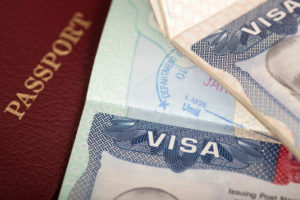 Presidential Proclamations 10014 and 10052 have been extended through March 31, 2021. The two proclamations, which suspend U.S. entry and visa issuance for many immigrant and nonimmigrant visa applicants outside the U.S., were set to end after December 31, 2020. Possible extensions were the subject of internal deliberations at the White House leading up to the New Year, with immigration restrictionists finally winning out over pro-business advocates who sought to let them expire.
Presidential Proclamations 10014 and 10052 have been extended through March 31, 2021. The two proclamations, which suspend U.S. entry and visa issuance for many immigrant and nonimmigrant visa applicants outside the U.S., were set to end after December 31, 2020. Possible extensions were the subject of internal deliberations at the White House leading up to the New Year, with immigration restrictionists finally winning out over pro-business advocates who sought to let them expire.
As a reminder, Proclamation 10014 stopped most family and business immigrant visa applicants (permanent visas that lead to Lawful Permanent Residency/Green Cards) and Proclamation 10052 halted new nonimmigrants seeking entry in H-1B, L-1, J-1, and H-2B visa categories. The Proclamations were deemed necessary to protect U.S. workers from foreign national workers alleged to be taking U.S. jobs during the COVID-19 economic crisis.
We wrote about immigrant visa Proclamation 10014 here, nonimmigrant Proclamation 10052 here, and the exceptions to the two Proclamations here. Exceptions to the Proclamations allow for visa issuance across several important industries, for those returning to the same employer, and those coming for activities in the U.S. “National Interest”, among other categories, but they require significant documentation and preparation to qualify.
A court order, which remains in effect, partially suspended the proclamations in October 2020, but it was limited only to Plaintiffs (the National Association of Manufacturers, the Chamber of Commerce of the United States of America, the National Retail Federation, Technet, and Intrax, Inc.) and their members. It should be noted, the Presidential Proclamations relating to the Novel Coronavirus travel restrictions for certain individuals traveling from China, Iran, the European Schengen Area, the United Kingdom and Ireland, and Brazil remain in effect until revoked by Presidential action.
President-Elect Biden will likely withdraw the Proclamations early in his tenure, but timing may depend on COVID conditions and the strength of U.S. economy when he takes office in three weeks. Even with a quick withdrawal of the Proclamations, the backlogs and delays resulting from their extended duration will likely slow the issuance of new visas for months to come.
On a slightly more positive note, the US State Department recently announced the continued phased resumption of routine visa services. The announcement clarifies that consular posts processing immigrant visa applications will prioritize Immediate Relative family members of U.S. citizens including intercountry adoptions, fiancées of U.S. citizens, and certain Special Immigrant Visa applications. Posts processing nonimmigrant visa applications will continue to prioritize travelers with urgent travel needs, foreign diplomats, and certain mission critical categories of travelers such as those coming to assist with the U.S. response to the pandemic, followed by students (F-1, M-1, and certain J-1) and temporary employment visas (consistent with Presidential Proclamation 10052). The volume and type of visa cases each post processes will depend on local circumstances, adequate resources and safety concerns.

